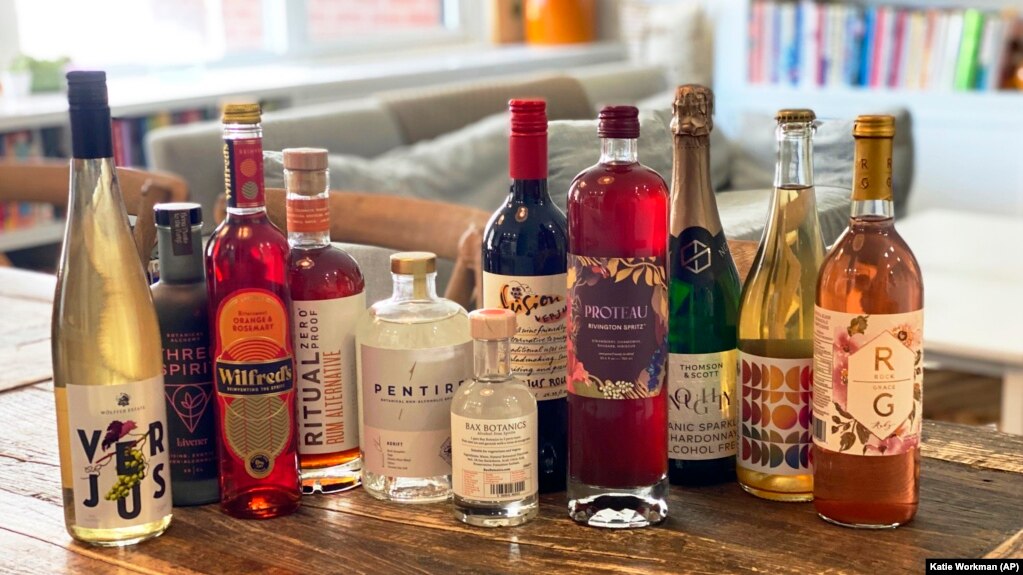AUDIO
Less or No Alcohol Is Better for Health

Alcohol is often consumed in social gatherings from happy hours after work to birthday parties on the weekend. Drinking some alcohol is normal and believed to be good for heart health.
However, new research may have put an end to that idea.
Dr. Timothy Naimi directs the Canadian Institute for Substance Use Research at the University of Victoria. He said, “Drinking less is a great way to be healthier.”
Are drinking guidelines changing?
Guidelines, or advice, for drinking alcohol differ greatly from country to country. But overall, the advice has been moving toward drinking less.
Britain, France, Denmark, Holland, and Australia recently reviewed new evidence and lowered the suggested amount of alcohol consumption.
Ireland went further than most. It will require cancer warning descriptions on alcohol starting in 2026.
Carina Ferreira-Borges is an adviser for alcohol at the World Health Organization office for Europe. She said scientists see “evidence linking alcohol to over 200 health conditions, including cancers, cardiovascular diseases and injuries.”
Overall, people may have already been moving toward drinking less alcohol. Social calendar events called “Dry January” and “Sober October” are celebrated with non-alcoholic drinks. "Dry" means no alcohol. And a sober person is not affected by alcohol.
“People my age are way more accepting of it,” said Tessa Weber. The 28-year-old from Austin, Texas said she stopped drinking for Dry January after seeing how alcohol increased her anxiety. She liked the results — better sleep, more energy — and has stuck with it.
Flawed studies on alcohol
The idea that alcohol can be heart-friendly came from imperfect studies comparing groups of people by how much they drink.
Usually, alcohol consumption was measured at one point in time. And none of them compare drinkers and non-drinkers. As a result, these studies could not prove cause and effect.
People who report drinking an average amount of alcohol usually have higher income, education, and better health care. “It turns out that when you adjust for those things, the benefits tend to disappear,” Dr. Naimi said.
Most studies also did not include younger people. And almost half of the people who die from alcohol-related causes die before the age of 50.
“If you’re studying people who survived into middle age, didn’t quit drinking because of a problem and didn’t become a heavy drinker, that’s a very select group,” Naimi said. “It creates an appearance of a benefit for moderate drinkers.”
Other studies challenge the idea that alcohol has benefits.
These studies compare people with a certain gene variant that makes it unpleasant to drink to people without this gene variant. People with this gene tend to drink very little or not at all. One of these studies found people with the gene variant have a lower risk of heart disease. This may supply more proof that alcohol does not protect people from heart problems.
How many drinks per day is safe?
So, how many alcoholic drinks can people safely have every day? That depends.
Drinking alcohol raises the risk of several kinds of cancer, including colon, liver, breast, mouth, and throat. Alcohol breaks down in the body into a substance called acetaldehyde. This substance can damage your cells and stop them from repairing themselves. That creates the conditions for cancer to grow.
Thousands of U.S. deaths per year could be prevented if people follow the U.S. government’s guidelines. They advise men to limit themselves to two drinks or fewer per day and women to one drink or fewer per day, Naimi said.
One drink is the equivalent of about one can of beer, a glass of wine, or a very small glass of hard alcohol.
Naimi served on an advisory committee. That committee wanted to lower the guideline for men to one drink per day. However, that advice was rejected when the federal guideline came out in 2020.
“The simple message that’s best supported by the evidence is that, if you drink, less is better when it comes to health,” Naimi said.
On its website, the National Institute of Health says some people should not consume alcohol at all. The agency says to avoid alcohol completely if you are:
- Taking medications that interact with alcohol
- Having a medical condition that can be made worse by drinking
- Under the age of 21, the minimum legal drinking age in the U.S.
- Recovering from alcohol use disorder or unable to control the amount you drink
- Pregnant or might become pregnant
________________________________________________
Words in This Story
consume – v. to eat or drink especially in great quantity
anxiety – n. fear or nervousness about what might happen
benefit – n. something that produces good or helpful results or effects or that promotes well-being
tend – v. to be likely
moderate – adj. avoiding extremes of behavior or expression : observing reasonable limits
variant – n. someone or something that exhibits variation from a type or norm
https://learningenglish.voanews.com/a/less-or-no-alcohol-is-better-for-health/7597334.html